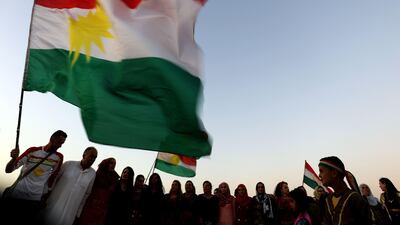The dramatic events that ensued in Iraq last week have overshadowed developments across the border in Syria. While the Kurdistan Regional Government of Iraq insisted on going ahead with the independence referendum despite international disapproval (which led to the shutdown of the Kurdistan region’s airspace), Syria’s Kurds were also making moves towards greater autonomy.
On September 22, Syrian Kurdish groups had the first of three rounds of voting, which by January next year, will culminate in an election of an assembly for an independent parliament.
While these local elections won't alter the dynamics of the Syrian war, their psychological impact is significant, as they act as a precursor for a fully-fledged government in northern Syria, where Kurdish armed groups are enjoying direct American backing.
Since 2011, Syria’s Kurds have been taking elaborate steps towards independence – even if they haven't explicitly stated it yet.
By accepting these elections, the US and other allies of Syria’s Kurds have encouraged them to take the next step, which eventually will lead to a call for independence. By then, rejecting calls for autonomy would be futile.
______________________
Read more on the Kurdish referendum in Opinion
Kurds need to combine diplomacy, strategy and persistence to advance their cause
Wisdom has been in short supply during the ill-conceived Kurdish referendum campaign
______________________
Through American and European support for Syria’s Kurds – political, financial and military – the echoes of Iraq’s Kurdish historic steps can be heard.
Since 1991, Iraq’s Kurdistan region has enjoyed semi-autonomous rule with heavy American backing.
Since 2003, the region has taken concrete steps to solidify its autonomy. It was baffling to see statement after statement of American"disappointment" last week that Iraq’s Kurds had finally acted on what they long publicly stated they would do, which is seek independence when "the time was right".
What few officials, both Iraqi and foreign, have wanted to publicly admit since 2003, however, is that the "right time" would have never come about had the Iraqi state been strong and effectively run. Kurdish political parties and officials were instrumental to the politics of Baghdad during hat time.
Indeed, as the Kurdistan regional government developed its own domestic policies, broadened its international representation and continually spoke of "a time in the future" to seek independence, developments on the ground pointed towards that move.
When Kurds retook Kirkuk from the hands of ISIL in the summer of 2014, it was clear that unilateral moves were becoming the norm.
Given that Germany chose to directly arm the peshmerga shortly thereafter, did they really expect its leaders, who had sacrificed so much by then, to turn around and relinquish their arms and power?
Little was done by international players – from Ankara to Washington DC – to support Iraq’s unity. While Iraq’s political class hold much responsibility for the poor state of affairs, specific actions from outsiders have led to the schism between Erbil and Baghdad.
Today, similar moves are ensuing in Syria. Fractured by war, the crimes of Syrian president Bashar Al Assad and militias in control on the ground, Damascus has been incrementally relinquishing its control over the Kurdish-dominated territories.
Like in Iraq, the fight against ISIL has been one that the Kurds have adopted, complete with a plan for post-ISIL control that other players lack.
______________________
Read more by Mina Al Oraibi
Reform takes centre stage at the UN as it faces up to its failings
The world cannot afford not to have a UN
______________________
According to a Turkish leak about US troops in Syria, American military presence spreads over 200 miles of the Kurdish-dominated areas. The small contingent of approximately 500 American troops there since 2016 is not enough to safeguard the area from regular attacks, but is a sure sign that the United States has interests there. There is enough American involvement to stir Kurdish aspirations, but not to fulfil them.
Last month, Brett McGurk, US special envoy to the anti-ISIL coalition, said that his country is "finding the pattern for a stable aftermath of ISIL" to be the Syrian Democratic Forces.
However, that stability is based on a short-term vision that will have long term consequences.
In November 2013, Kurdish forces unilaterally declared "The Democratic Federation of Northern Syria", which they call Rojava, an autonomous region in Syria, and in March 2016, went on to declare the "autonomous cantons" of Afrin, Jazira and Kobani as self-ruling. Today, they have arms and established external support, with an eye on Erbil as a model to follow.
While Washington and EU players signal their support for the Kurds, Turkey and Iran are, of course, significant players and have their own Kurdish-dominated areas that they also worry will follow a similar path.
Turkey continues to consider its own Kurdistan Workers' Party (PKK) and the PYD, Syria’s Kurdish Democratic Party, a "terrorist organisation". Turkish president Recep Tayeb Erdogan recently said in New York that "I cannot understand how the US uses one terrorist organisation to fight another" in reference to the US allying with PYD to fight ISIL.
Kurdish political parties and armed groups from both countries, like the PKK and Kurdish Democratic Party of Iran, for example, have a presence in the Iraqi Kurdish region and have operated from there.
Likewise, a stable, Kurdish-dominated region in Syria would pave the way for the activities of other Kurdish groups. This is not a potential threat, but a direct threat to Tehran and Ankara. Some may think this is a useful tool against Tehran or Ankara, but the reality is that such antagonism can have bloody consequences.
Reaching a compromise that will allow the Kurds of Iraq and Syria to maintain their gains without undermining both countries – and the region – will take strategic thinking and ample political investment.
Follow The National's Opinion section on Twitter


